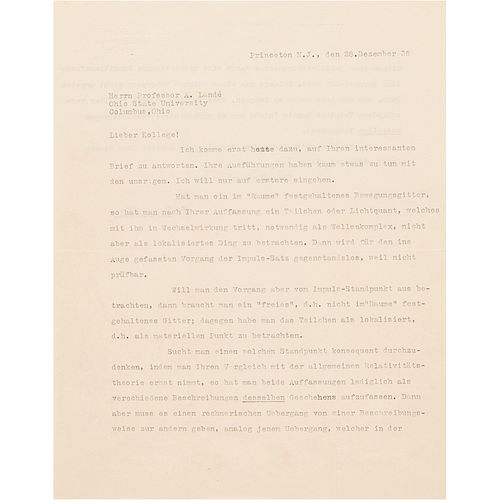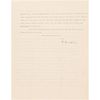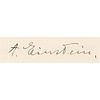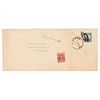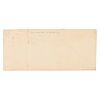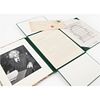Albert Einstein Typed Letter Signed on the Theory of Relativity
Two ways to bid:
- Leave a max absentee bid and the platform will bid on your behalf up to your maximum bid during the live auction.
- Bid live during the auction and your bids will be submitted real-time to the auctioneer.
Bid Increments
| Price | Bid Increment |
|---|---|
| $0 | $5 |
| $50 | $10 |
| $200 | $25 |
| $500 | $50 |
About Auction
Mar 13, 2024
RR Auction's March 2024 Fine Autographs and Artifacts auction features 650+ rare and remarkable items. The sale is highlighted by a robust selection of original animation artwork, including Eyvind Earle's remarkable landscape panoramas, Mary Blair's whimsical concept paintings, and production cels from Walt Disney classics like Snow White, Pinocchio, Lady and the Tramp, Peter Pan, and Cinderella. RR Auction support@rrauction.com
- Lot Description
TLS in German, signed “A. Einstein,” one page both sides, 8.5 x 10.75, blindstamped personal Princeton letterhead, December 28, 1935. Letter to German-American physicist Alfred Landé, a professor at Ohio State University, regarding the theory of relativity and quantum mechanics. In full (translated): "I am only today answering your interesting letter. Your comments have little to do with ours. I only want to respond to the former. In your opinion, if there is a moving frame of reference fixed in 'space,' a particle or quantum of light that interacts with it must necessarily be regarded as a complex wave, not as a localized body. Then, for this event as envisaged, the conservation of momentum principle becomes meaningless, since it cannot be tested.
But if you want to look at this event from the point of view of the conservation of momentum, then you need a 'free' frame of reference, i.e. one not fixed in space. On the other hand, you can now consider the particle as localized, i.e., as a material point.
If one seeks to consistently think through such a point of view by taking seriously your comparison with the general theory of relativity, then one should consider both views merely as different descriptions of the same event. But there must be a computational transition from one kind of description to another, analogous to that transition that is made in the general theory of relativity by a non-linear point transformation. As long as one cannot specify such a transition, one has no right to deny that these are two real and different events, not just different descriptions of the same event. It would be nice if you could tell me your opinion on this point." In fine condition. Accompanied by the original mailing envelope, and housed in a handsome custom-made quarter-leather presentation folder, with marbled boards and gilt-stamped spine.
The recipient, Alfred Landé, made significant contributions to quantum theory, and would go on to publish Principles of Quantum Mechanics in 1937, followed by Quantum Mechanics (1951), and Foundations of Quantum Theory: A Study in Continuity and Symmetry (1955). Contrary to Einstein, Landé began as a strong proponent of the 'Copenhagen school' of quantum mechanics, as promulgated by Niels Bohr, Werner Heisenberg, Max Born, and others. Later, Landé would join Einstein in attacking the Copenhagen interpretation, a change driven by Landé's perception that wave-particle duality was an unnecessary misrepresentation of quantum processes that he instead explained by developing a new unitary particle formulation, without dualistic reference to waves. An important piece of scientific correspondence, as Einstein discusses the perceived shortcomings of the influential emerging theories of physical science.
Provenance: Property from the Roger D. Judd Collection of Historical Letters, Documents and Manuscripts, Christie's, June 12, 2019; Sotheby's, November 17, 1988. - Shipping Info
-
Bidder is liable for shipping and handling and providing accurate information as to shipping or delivery locations and arranging for such. RR Auction is unable to combine purchases from other auctions or affiliates into one package for shipping purposes. Lots won will be shipped in a commercially reasonable time after payment in good funds for the merchandise and the shipping fees are received or credit extended, except when third-party shipment occurs. Bidder agrees that service and handling charges related to shipping items which are not pre-paid may be charged to a credit card on file with RR Auction. Successful international Bidders shall provide written shipping instructions, including specified Customs declarations, to RR Auction for any lots to be delivered outside of the United States. NOTE: Declaration value shall be the item’(s) hammer price and RR Auction shall use the correct harmonized code for the lot. Domestic Bidders on lots designated for third-party shipment must designate the common carrier, accept risk of loss, and prepay shipping costs.
-
- Buyer's Premium



 EUR
EUR CAD
CAD AUD
AUD GBP
GBP MXN
MXN HKD
HKD CNY
CNY MYR
MYR SEK
SEK SGD
SGD CHF
CHF THB
THB